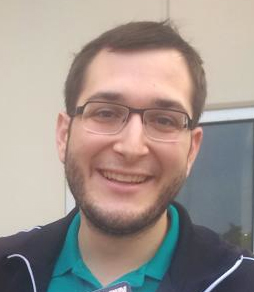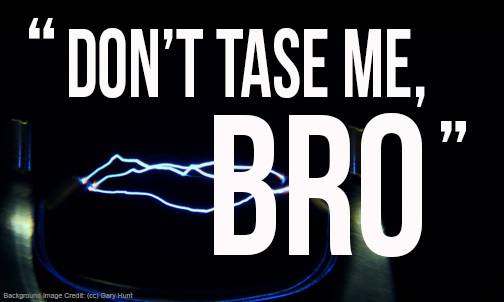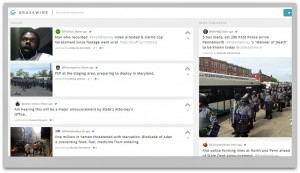
Andrew Meyer
Andrew Meyer became an instant media sensation in 2007 after police officers arrested him after he tried to ask then-Sen. John Kerry several questions at a student forum. Many still recall the viral video footage of Meyer, then a University of Florida senior journalism major, fervently shouting out the now-infamous phrase “Don’t tase me, bro!” as campus officers tackled and wrestled him to the ground. Nearly seven years later, Meyer is making headlines once again – but for a completely different reason.
Meyer, 27, was hired in January as a full-time staff writer for Photography is Not a Crime, a Miami-based First Amendment blog.
Photojournalist Carlos Miller started the blog in 2007 to document his trial after he was arrested for taking photos of five Miami officers while working for a local news site, according to his website. The blog relies heavily on user-submitted materials and raises questions about the actions of public safety officials, especially in cases where they restrict the ability of people to take photos or video.
AJR.org recently caught up with Meyer. Here are excerpts from the interview.
AJR: How did you get the job at Photography is Not a Crime and what made you want to write for that blog?
Andrew Meyer: [Carlos Miller] is doing the groundbreaking work of really reporting what’s going on with First Amendment issues and law enforcement and I wanted to be a part of that. For example, last year Carlos did a story on Andrew Henderson, a Minnesota man who was arrested for filming the police. After Carlos posted that story, which publicized the fact that Henderson was in need of an attorney, suddenly the ACLU had hundreds of people calling them saying, ‘Take this guy’s case.’ As a result, the ACLU took his case and Henderson actually had the charges against him dropped. So it’s powerful journalism. …When I saw that he was looking for new writers, I jumped at the opportunity. I have a lot of respect for him and I know that’s an audience with integrity.
AJR: What has it been like working for Carlos, someone who, like you, was arrested?
Meyer: Carlos and I are both on a mission to help people see the reality of what’s going on, to cover the stories that local news should be covering but for some reason isn’t. The only person I could work with is someone who is trying to tell the truth.
AJR: How would you describe PINAC and what kinds of stories can you expect to find on the site?
Meyer: The blog really expanded when readers began sending in stories of people being arrested just for taking photographs. A community grew up around that and now we have an amazing audience [that is] truly passionate about the rights of people. A lot of times we’re covering law enforcement overstepping their bounds, especially in regards to photography and the First Amendment. For example, I recently did a story on Roger Shuler, an Alabama blogger who was arrested simply because the political machine didn’t like the direction of his stories.
AJR: As a college student back in 2007, what was it like to become famous virtually overnight?
Meyer: It was surreal; I wasn’t prepared for it. I wish I would have had the wherewithal to open all my emails and start writing on it immediately. But for me, there was just a kind of paralysis. Not only was I suddenly on every news show, but I was facing legal charges and being called every name you could possibly imagine and being lied about on TV. The reporting on me was just absurd. The very first sentence of one AP story said I was a well-known prankster, which was completely false. I was only well-known for being a columnist and a writer. I felt like I was being attacked on all sides. … As a journalist, you have no idea how big your responsibility is until suddenly your work is in the spotlight. Sometimes it feels like you’re writing from the moon and you wonder if your work is affecting anything. But one day you’ll see you’re really affecting people, so just be ready for that. Like a good boy scout, always be prepared.
AJR: Do people still recognize you and remember the incident today?
Meyer: I have a beard and wear glasses most of the time, so even if people did know what I looked like, they wouldn’t recognize me. But when I’m passing stuff out, like if I’m promoting my website or something and they see the name and make the connection, then they get very excited. A lot of people are really fired up about the story and, to this day, I still get emails from people who saw the video for the first time, asking me to talk about my experience. In fact, I launched an Indiegogo campaign, which can be accessed through my website, theandrewmeyer.com, so people can help bring me to college campuses to speak about my experience. That has been great because I learned so much from that incident and I have so much that I want to share with people.
AJR: You majored in journalism at the University of Florida but then you went on to law school. Were you always interested in law or did the 2007 incident inspire you to get a law degree?
Meyer: It was absolutely the 2007 experience that pushed me to go to law school. There were a lot of legal things going on that showed me how completely unprepared I was for the reality of the world. There’s a reason that lawyers are paid thousands of dollars just for their knowledge – it’s because the knowledge that they have is extremely valuable. That whole incident just opened my eyes to how important it is to understand the laws around you and, even if just for your own personal sake, fully know and understand your rights.
AJR: Do you feel that journalists have freedom today to ask all the questions they want and take pictures freely?
Meyer: The journalism environment is like the best of times and the worst of times. While you have the Internet and you can instantaneously put a story out to as many people as are interested and you have video that you can not only take from your phone and stream it instantly to that audience, it seems to me that there are more aggressive police on the streets than ever before, completely violating people’s constitutional rights. A lot of police basically feel that the law is whatever they say it is, which is a dangerous mentality. So yeah, there are the most restrictions but also the most freedoms.
AJR: What do you feel that your role in journalism is today?
Meyer: My role is just to push out the stories that people otherwise wouldn’t get. And there are a lot of them, a lot of very important stories. For example, we heard a lot about Fukushima when it first happened but no one’s talking today about the radiation showing up on California’s beaches right now. There are a lot of stories that an active and free press should be covering but you don’t see getting covered. And that was really my intention in the first place when I went to talk to John Kerry. It was to ask him the questions that no one was asking him. My role now is the same as it was then, which is to awaken people to the stories that are being censored or suppressed or simply not put out.
AJR: What are your career goals?
Meyer: Journalism is something that will probably always be with me. If the world became a utopia and there was no longer any dirt to be uncovered, then I could just could just do recommendations of good things. I could write about the best bands you’ve never heard of or the best movies you’ve never seen – creative things like that which I like to do anyway. I don’t know where I’ll be going forward but I have a lot of different interests. People always want to put someone in a box. Like when you hear the name Matt Damon, you think, ‘Oh he’s an actor.’ Well he’s also an amazing activist and he does a lot of humanitarian work in Africa. There are a lot of people out there that are multifaceted. I was doing sketch comedy at the same time that I was doing journalism in college. I was doing sports writing and all kinds of things. People only know me as ‘Don’t tase me bro’ but I had a lot going then and I have a lot going on now.
Follow AJR on Twitter: @AmJourReview









Leave a Comment